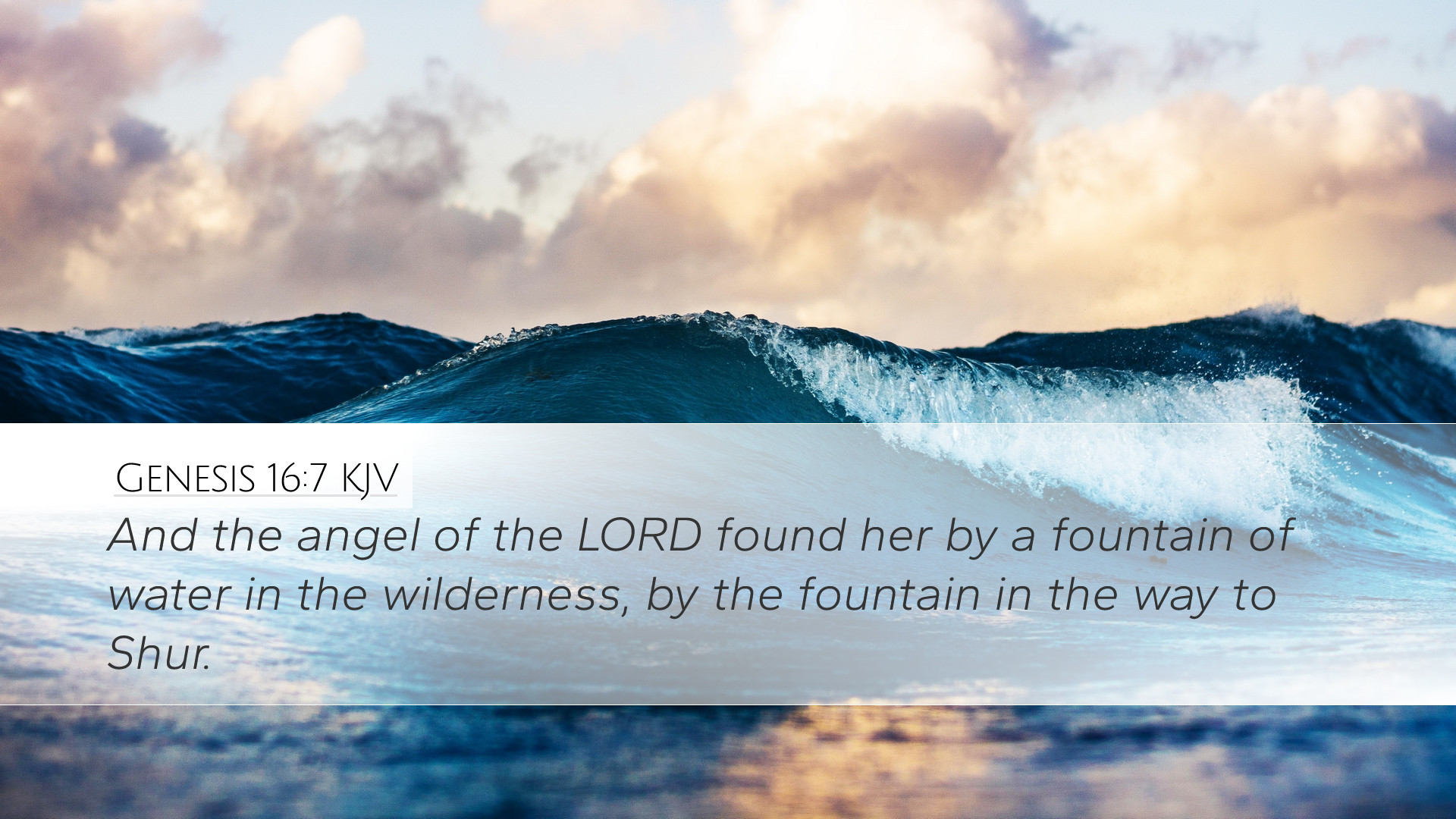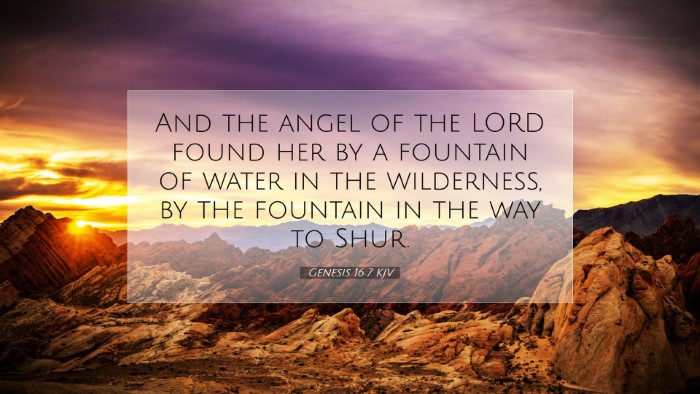Commentary on Genesis 16:7
Genesis 16:7 states: "And the angel of the Lord found her by a fountain of water in the wilderness, by the fountain in the way to Shur." This brief yet profound verse unpacks several critical themes in biblical theology, particularly concerning God's providence, mercy, and the nature of human suffering. Below is a summarized commentary integrating insights from various public domain sources.
Contextual Overview
Genesis 16 details the story of Hagar, Sarai's maid, who is caught in a situation of desperation and turmoil. The circumstances driving her into the wilderness are essential for understanding the significance of God's intervention in her life.
The Angel of the Lord
Matthew Henry notes that the term "Angel of the Lord" often signifies God’s presence and involvement in human affairs. This angel is not merely a messenger but represents God's active engagement in the lives of His people. The divine appearance signifies hope amidst despair, underscoring that God does not abandon those in suffering.
The Wilderness as a Place of Encounter
Albert Barnes highlights that the wilderness setting of this encounter symbolizes a spiritual and physical desolation that many believers experience. The wilderness is often a figurative space where one finds themselves lost, cut off from community and support. In Hagar’s case, fleeing into the wilderness signifies both her literal flight from oppression and her profound need for divine intervention.
Hagar's experience is pertinent for many pastors and theologians who study the expressions of marginalized individuals within scripture. This moment provides a paradigm for recognizing God's presence during our most isolating experiences.
Divine Providence
In the broader context of Genesis, God's provision is a recurring theme. Here, Adam Clarke emphasizes that the finding of Hagar by the angel reflects God’s overarching providence. Even when people are in positions of shame or abandonment, God's aim is to offer restoration rather than rejection. This reinforces a critical theological principle: God’s presence often manifests during times of trial.
God's Compassion for the Marginalized
This verse offers a poignant reflection on God's compassion. Hagar, an Egyptian servant, represents a marginalized figure in the biblical narrative. The attention she receives from the “Angel of the Lord” signifies that God's concern extends beyond the patriarchal and elite. Matthew Henry affirms this by stating that God's mercy is particularly directed at those who are humiliated and oppressed.
Symbolism of Water
The mention of "a fountain of water in the wilderness" serves as a powerful symbol. Water, in biblical literature, often represents life, refreshment, and sustenance. Albert Barnes suggests that finding a fountain in a desolate place is emblematic of God providing refreshment in barren situations. This alludes not only to physical sustenance but also spiritual rejuvenation.
Theological Implications
For students and scholars, this encounter raises significant theological inquiries about God's relationship with humans during crises. The wilderness is not merely a physical space but a state of spiritual searching. Hagar’s meeting with the angel symbolizes hope and the presence of God even when His ways are not understood. Adam Clarke points out that such moments reassure believers of God's ongoing desire to guide and support them through life’s challenges.
Response to Divine Intervention
How one responds to God’s intervention is vital in understanding the spiritual journey. Hagar's encounter necessitates a reaction that transitions from despair to hope. Matthew Henry posits that when God shows favor towards us, our response should be one of worship and gratitude, recognizing the kindness shown even when circumstances seem bleak.
Final Reflections
Genesis 16:7 encapsulates densely packed theological insights regarding God’s relentless pursuit of humanity, especially those who feel lost and alienated. The grace extended to Hagar stands as a profound reminder to all in ministry, scholarship, and personal faith walks that God sees, hears, and acts on behalf of those who cry out in their wildernesses.
Application for Pastors and Theologians
- Emphasize God's Active Presence: Encourage congregations to recognize that God is actively involved in their lives, especially during hardships.
- Facilitate Healing Spaces: Pastors can create environments where individuals feel safe to share their wilderness experiences, fostering a community of healing.
- Encourage Personal Reflection: Students and scholars should reflect on their wilderness experiences and how they have encountered God in those moments.
Conclusion: Genesis 16:7 reminds us that God's compassion transcends cultural boundaries and human status, challenging church leaders and believers alike to extend kindness and support to those in need.


